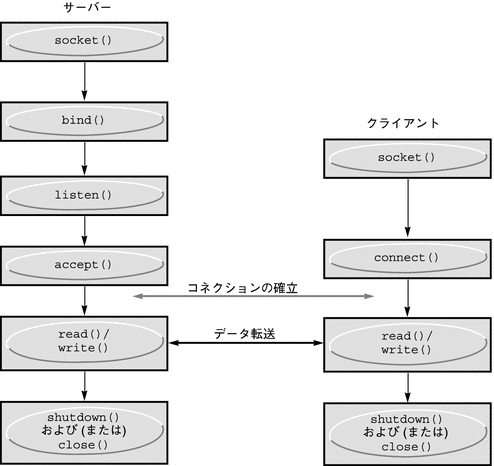ストリームソケットのコネクション
次の 2 つの例に、インターネットファミリのストリームコネクションの開始と受け入れを示します。
図 8–1 ストリームソケットを使用したコネクション型の通信

次のプログラムはサーバーの例です。このサーバーは、ソケットを作成し、そのソケットに名前をバインドし、そして、ポート番号を表示します。このプログラムは listen(3SOCKET) を呼び出して、ソケットがコネクション要求を受け入れる用意ができていることをマークし、要求の待ち行列を初期化します。プログラムの残りの部分は無限ループです。ループの各パスは、新しいソケットを作成することによって新しいコネクションを受け入れ、待ち行列からそのコネクションを削除します。サーバーは、ソケットからのメッセージを読み取って表示し、ソケットを閉じます。in6addr_any の使用については、「アドレスのバインド」で説明しています。
例 8–1 インターネットストリームコネクションの受け入れ (サーバー)
#include <sys/types.h>
#include <sys/socket.h>
#include <netinet/in.h>
#include <netdb.h>
#include <stdio.h>
#define TRUE 1
/*
* This program creates a socket and then begins an infinite loop.
* Each time through the loop it accepts a connection and prints
* data from it. When the connection breaks, or the client closes
* the connection, the program accepts a new connection.
*/
main() {
int sock, length;
struct sockaddr_in6 server;
int msgsock;
char buf[1024];
int rval;
/* Create socket. */
sock = socket(AF_INET6, SOCK_STREAM, 0);
if (sock == -1) {
perror("opening stream socket");
exit(1);
}
/* Bind socket using wildcards.*/
bzero (&server, sizeof(server));
server.sin6_family = AF_INET6;
server.sin6_addr = in6addr_any;
server.sin6_port = 0;
if (bind(sock, (struct sockaddr *) &server, sizeof server)
== -1) {
perror("binding stream socket");
exit(1);
}
/* Find out assigned port number and print it out. */
length = sizeof server;
if (getsockname(sock,(struct sockaddr *) &server, &length)
== -1) {
perror("getting socket name");
exit(1);
}
printf("Socket port #%d\n", ntohs(server.sin6_port));
/* Start accepting connections. */
listen(sock, 5);
do {
msgsock = accept(sock,(struct sockaddr *) 0,(int *) 0);
if (msgsock == -1)
perror("accept");
else do {
memset(buf, 0, sizeof buf);
if ((rval = read(msgsock,buf, sizeof(buf))) == -1)
perror("reading stream message");
if (rval == 0)
printf("Ending connection\n");
else
/* assumes the data is printable */
printf("-->%s\n", buf);
} while (rval > 0);
close(msgsock);
} while(TRUE);
/*
* Since this program has an infinite loop, the socket "sock" is
* never explicitly closed. However, all sockets are closed
* automatically when a process is killed or terminates normally.
*/
exit(0);
}
コネクションを開始するため、例 8–2 のクライアントプログラムでは、ストリームソケットを作成し、コネクションのためのソケットのアドレスを指定して connect(3SOCKET) を呼び出しています。宛先ソケットが存在し、要求が受け入れられる場合、コネクションは完了します。すると、プログラムはデータを送信できます。データは、メッセージ境界なしで順番に配信されます。コネクションは、一方のソケットが閉じられた時点で遮断されます。このプログラムに含まれる ntohl(3SOCKET)、ntohs(3SOCKET)、htons(3SOCKET)、および htonl(3XNET) などのデータ表現ルーチンの詳細は、byteorder(3SOCKET) のマニュアルページを参照してください。
例 8–2 インターネットファミリのストリームコネクション(クライアント)
#include <sys/types.h>
#include <sys/socket.h>
#include <netinet/in.h>
#include <netdb.h>
#include <stdio.h>
#define DATA "Half a league, half a league . . ."
/*
* This program creates a socket and initiates a connection with
* the socket given in the command line. Some data are sent over the
* connection and then the socket is closed, ending the connection.
* The form of the command line is: streamwrite hostname portnumber
* Usage: pgm host port
*/
main(int argc, char *argv[])
{
int sock, errnum, h_addr_index;
struct sockaddr_in6 server;
struct hostent *hp;
char buf[1024];
/* Create socket. */
sock = socket( AF_INET6, SOCK_STREAM, 0);
if (sock == -1) {
perror("opening stream socket");
exit(1);
}
/* Connect socket using name specified by command line. */
bzero (&server, sizeof (server));
server.sin6_family = AF_INET6;
hp = getipnodebyname(argv[1], AF_INET6, AI_DEFAULT, &errnum);
/*
* getipnodebyname returns a structure including the network address
* of the specified host.
*/
if (hp == (struct hostent *) 0) {
fprintf(stderr, "%s: unknown host\n", argv[1]);
exit(2);
}
h_addr_index = 0;
while (hp->h_addr_list[h_addr_index] != NULL) {
bcopy(hp->h_addr_list[h_addr_index], &server.sin6_addr,
hp->h_length);
server.sin6_port = htons(atoi(argv[2]));
if (connect(sock, (struct sockaddr *) &server,
sizeof (server)) == -1) {
if (hp->h_addr_list[++h_addr_index] != NULL) {
/* Try next address */
continue;
}
perror("connecting stream socket");
freehostent(hp);
exit(1);
}
break;
}
freehostent(hp);
if (write( sock, DATA, sizeof DATA) == -1)
perror("writing on stream socket");
close(sock);
freehostent (hp);
exit(0);
}
ストリームソケットに 1 対 1 の SCTP コネクションのサポートを追加できます。次の例のコードでは、既存のプログラムに -p を追加することにより、使用するプロトコルをプログラムで指定できるようにしています。
例 8–3 ストリームソケットへの SCTP サポートの追加
#include <stdio.h>
#include <netdb.h>
#include <string.h>
#include <errno.h>
int
main(int argc, char *argv[])
{
struct protoent *proto = NULL;
int c;
int s;
int protocol;
while ((c = getopt(argc, argv, "p:")) != -1) {
switch (c) {
case 'p':
proto = getprotobyname(optarg);
if (proto == NULL) {
fprintf(stderr, "Unknown protocol: %s\n",
optarg);
return (-1);
}
break;
default:
fprintf(stderr, "Unknown option: %c\n", c);
return (-1);
}
}
/* Use the default protocol, which is TCP, if not specified. */
if (proto == NULL)
protocol = 0;
else
protocol = proto->p_proto;
/* Create a IPv6 SOCK_STREAM socket of the protocol. */
if ((s = socket(AF_INET6, SOCK_STREAM, protocol)) == -1) {
fprintf(stderr, "Cannot create SOCK_STREAM socket of type %s: "
"%s\n", proto != NULL ? proto->p_name : "tcp",
strerror(errno));
return (-1);
}
printf("Success\n");
return (0);
}
- © 2010, Oracle Corporation and/or its affiliates
